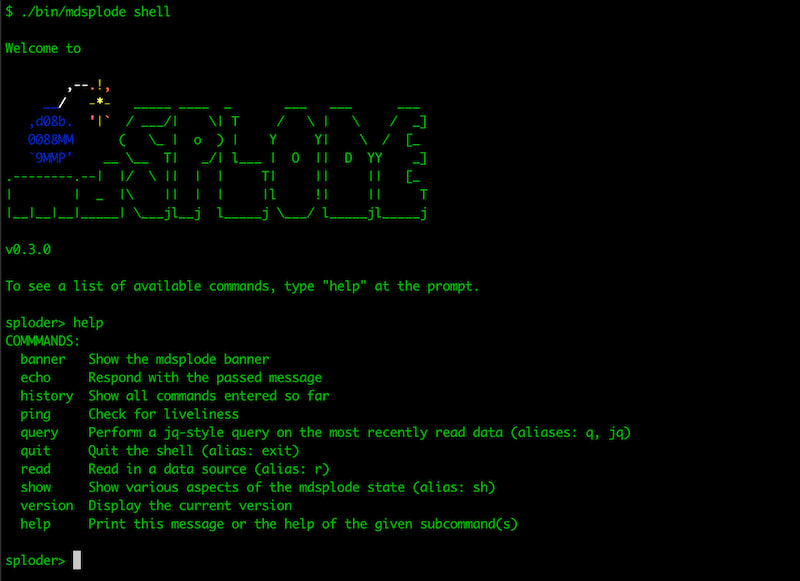6 releases (breaking)
| 0.4.1 | Jan 8, 2024 |
|---|---|
| 0.4.0 | Jan 7, 2024 |
| 0.3.0 | Jan 5, 2024 |
| 0.2.0 | Jan 1, 2024 |
| 0.0.0 | Dec 26, 2023 |
#2090 in Command line utilities
78 downloads per month
47KB
1K
SLoC
mdsplode
A CLI tool for exploding and serialising Markdown files (metadata, AST, rendered parts, and rendered whole)
About
This tool came about as a result of a pressing need in some LFE projects that required finer-grained processing of Markdown files for publishing projects.
Dependencies
The project is written in Rust and depends upon that toolchain as well as the usual gcc toolchain. In addition, the library files for jq and oniguruma are needed. For instructions on how to install these, see Supporting jq Queries.
Shell
The primary use case for mdsplode is to be managed my another long-running process that writes to mdsplode's stdin and reads from its stdout. This is accomplished via an interactive shell.
The shell is started with that as the command on the CLI:
cargo install mdsplode
mdsplode shell
Or, from a clone of this repo:
cd mdsplode
make build
./bin/mdsplode shell
A quick session:
sploder> read md "tests/data/learn.md"
Loaded "tests/data/learn.md"
sploder> show in-file
tests/data/learn.md
sploder> show source
... # Markdown data
sploder> show parsed
... # JSON data
sploder> read json "tests/data/parsed.json"
Loaded "tests/data/parsed.json"
sploder> query '.children.nodes[] | select(.depth == 3) | .source'
"Sub Heading 1"
"Sub Heading 2"
sploder> query --pretty '.children.nodes[] | select(.source == "Sub Heading 1")'
{
"children": {
"html": "<p>Sub Heading 1</p>",
"json": "",
"nodes": [
{
"children": {
"html": "",
"json": "",
"nodes": []
},
"depth": -1,
"html": "<p>Sub Heading 1</p>",
"name": "text",
"source": "Sub Heading 1"
}
]
},
"depth": 3,
"name": "heading",
"source": "Sub Heading 1"
}
sploder> read md "tests/data/learn.md"
Loaded "tests/data/learn.md"
sploder> show fm
{
"frontmatter": {
"extra": {
"long_description": "Learning LFE must be taken in three tracks: learning the syntax particular to a Lisp on the Erlang VM, with all its support for pattern matching, Erlang-style arities, etc.; learning the ins-and-outs of BEAM languages and OTP; and finally, more deeply exploring the Lisp heritage of LFE. This multi-pronged approach is the path to success.",
"long_title": "Resources for Learning LFE"
},
"in_search_index": true,
"title": "Learn"
}
}
sploder> quit
Quitting ...
CLI Usage
View all of the exploded parsed data:
./bin/mdsplode \
--input ./tests/data/learn.md \
--pretty
See a filtered subset, for example, the exploded metadata for a particular Markdown heading:
./bin/mdsplode \
--input ./tests/data/learn.md \
--pretty \
--query '.children.nodes[] | select(((.depth == 3) and .name == "heading") and .source == "Getting Started")'
Important!: When using --pretty, only jq queries which result in valid JSON should be used; anything else will result in JSON parsing errors (since the use of --pretty requires a re-parsing to JSON for the post-query results).
Get the HTML for all headings of depth 3:
./bin/mdsplode \
--input ./tests/data/learn.md \
--query '.children.nodes[] | select((.depth == 3) and .name == "heading") | .children.nodes[].html'
That command doesn't produce valid JSON, so the --pretty wasn't used (to avoid errors and because it simply wasn't applicable).
Query to pull out the front matter:
./bin/mdsplode \
--input ./tests/data/learn.md \
--query '.children.nodes[] | select(.name == "toml") | .json'
Since that field is serialised JSON, we can pipe it to jq as a raw string and then again to parse it as JSON and pretty-print it:
echo `!!` | jq -r . | jq .frontmatter
{
"in_search_index": true,
"title": "Learn",
"extra": {
"long_description": "Learning LFE must be taken in three tracks: learning the syntax particular to a Lisp on the Erlang VM, with all its support for pattern matching, Erlang-style arities, etc.; learning the ins-and-outs of BEAM languages and OTP; and finally, more deeply exploring the Lisp heritage of LFE. This multi-pronged approach is the path to success.",
"long_title": "Resources for Learning LFE"
}
}
Note that mdsplode also supports operating on directories (for processing multiple files in one go).
License
Copyright © 2023-2024, Oxur Group
Apache License, Version 2.0
Dependencies
~10–23MB
~280K SLoC

